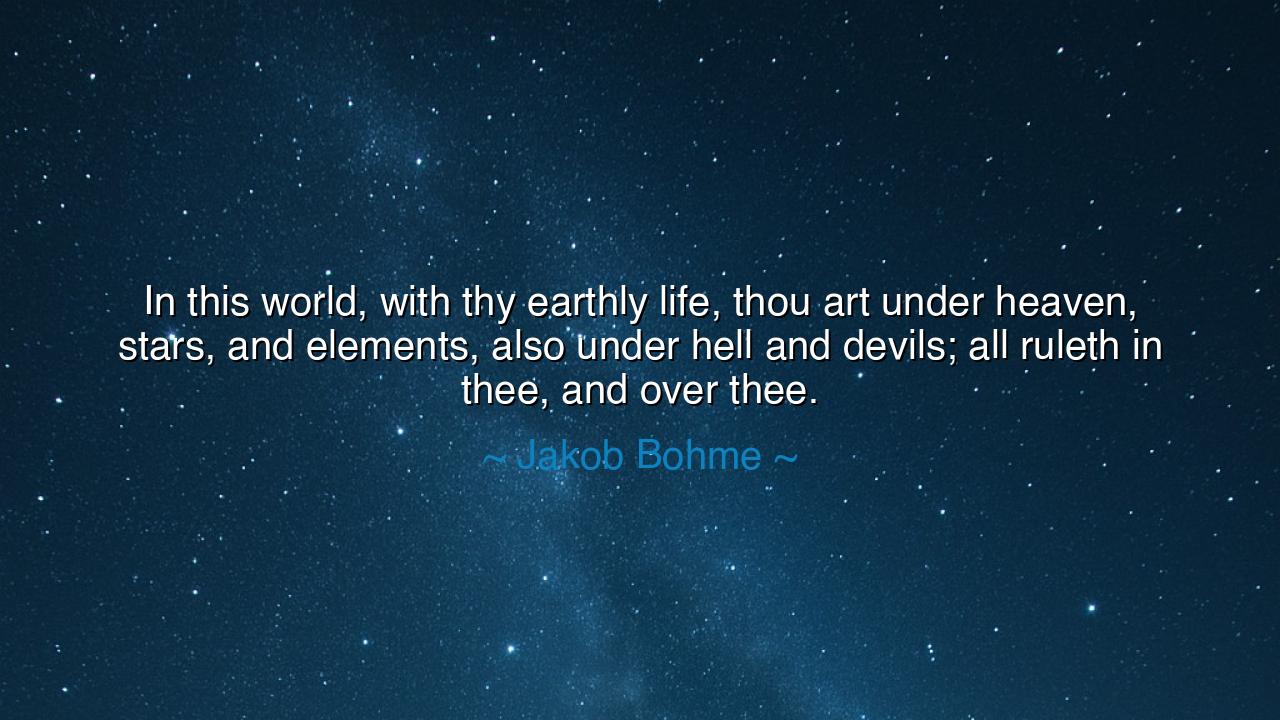
In this world, with thy earthly life, thou art under heaven
In this world, with thy earthly life, thou art under heaven, stars, and elements, also under hell and devils; all ruleth in thee, and over thee.






In the vast tapestry of existence, where the earth meets the heavens and the stars guide our fate, there lies a profound truth—one that Jakob Böehme captured with haunting clarity when he said, "In this world, with thy earthly life, thou art under heaven, stars, and elements, also under hell and devils; all ruleth in thee, and over thee." These words speak to the very essence of the human experience: that we, as mortal beings, exist in a delicate balance between the forces of the divine and the demonic, between the heavenly and the earthly. Our lives are shaped not only by the visible world around us but by the invisible forces that stir within us—forces that can elevate or drag us into the depths of despair.
Böehme’s vision is one that recognizes the duality of existence, where every individual is caught in the pull of two realms. Heaven represents the highest aspirations of mankind, the divine spark that calls us toward goodness, truth, and enlightenment. Hell, on the other hand, symbolizes the darkness within us—the desires, fears, and tendencies that drive us toward chaos, sin, and destruction. But these two forces are not separate from us; they live within us, shaping our thoughts, our actions, and our very soul. As Böehme suggests, we are ruled by these forces, both within and without. The stars and elements, representing the natural world, also hold sway over us, guiding our destiny with their mysterious, often unpredictable influence.
The great philosophers and spiritual leaders of the past have long recognized this tension. Plato spoke of the soul’s struggle between the higher realms of thought and the base desires of the body. Socrates urged his followers to seek the good above all else, but he knew that the human soul is often tempted by the lower impulses that lead it astray. In the Bible, the story of Adam and Eve reflects the same duality, where mankind is given the choice to follow the path of righteousness or to fall into temptation, choosing the earthly over the divine. These ancient teachings align with Böehme’s understanding: that we are both the rulers and the ruled, caught in a battle that defines our existence.
Consider, for example, the life of Nelson Mandela, who endured imprisonment for 27 years and yet emerged as a beacon of hope and reconciliation for a divided nation. In his heart, Mandela was caught between the forces of hatred and forgiveness, between the devils of vengeance and the angels of peace. His life demonstrates the power of choice in the face of overwhelming adversity. Like all of us, Mandela was subject to the forces of heaven and hell, of light and dark. Yet, his ability to choose the higher path, even when surrounded by the temptation of anger and retribution, made him one of the most revered figures in history. His life stands as a testament to the human capacity to rise above the lower instincts and embrace the forces that bring healing and unity.
Böehme’s words also remind us of the power of the elements, the natural world, and how it influences us. The earth, air, fire, and water are not mere external forces; they are reflected in the very nature of our existence. The elements within us—the passions, the intellect, the spirit, and the body—are often in conflict, each vying for control over our lives. The stars above us represent the fate and destiny that shape our journey, but we are not slaves to the cosmos. We are called to engage with the elements of our being, to understand them, and to find harmony in the face of their conflicting influences.
The lesson from Böehme’s profound insight is clear: life is not a simple matter of good versus evil, light versus dark. It is a struggle within each of us, a daily battle between the forces that rule over us. Wisdom lies not in ignoring these forces, but in recognizing them and learning to navigate their pull. We must accept that the heavenly and the hellish both reside within us, but we do not need to be ruled by them. Self-awareness, discipline, and a commitment to higher principles can help us chart a course that aligns more with the divine than the destructive.
As we journey through life, let us remember that we are always under the influence of forces beyond our control, but we also have the power to choose how we react to them. The devils within us—the greed, the fear, the pride—can be subdued by the angels of compassion, humility, and love. Let us learn from the great souls who have gone before us, who have embraced their inner struggle and emerged victorious, not through the absence of conflict, but through their response to it. Each day is a chance to choose the higher path, to transcend the earthly and the hellish, and to align ourselves with the heavenly forces that guide us toward peace and enlightenment.






AAdministratorAdministrator
Welcome, honored guests. Please leave a comment, we will respond soon